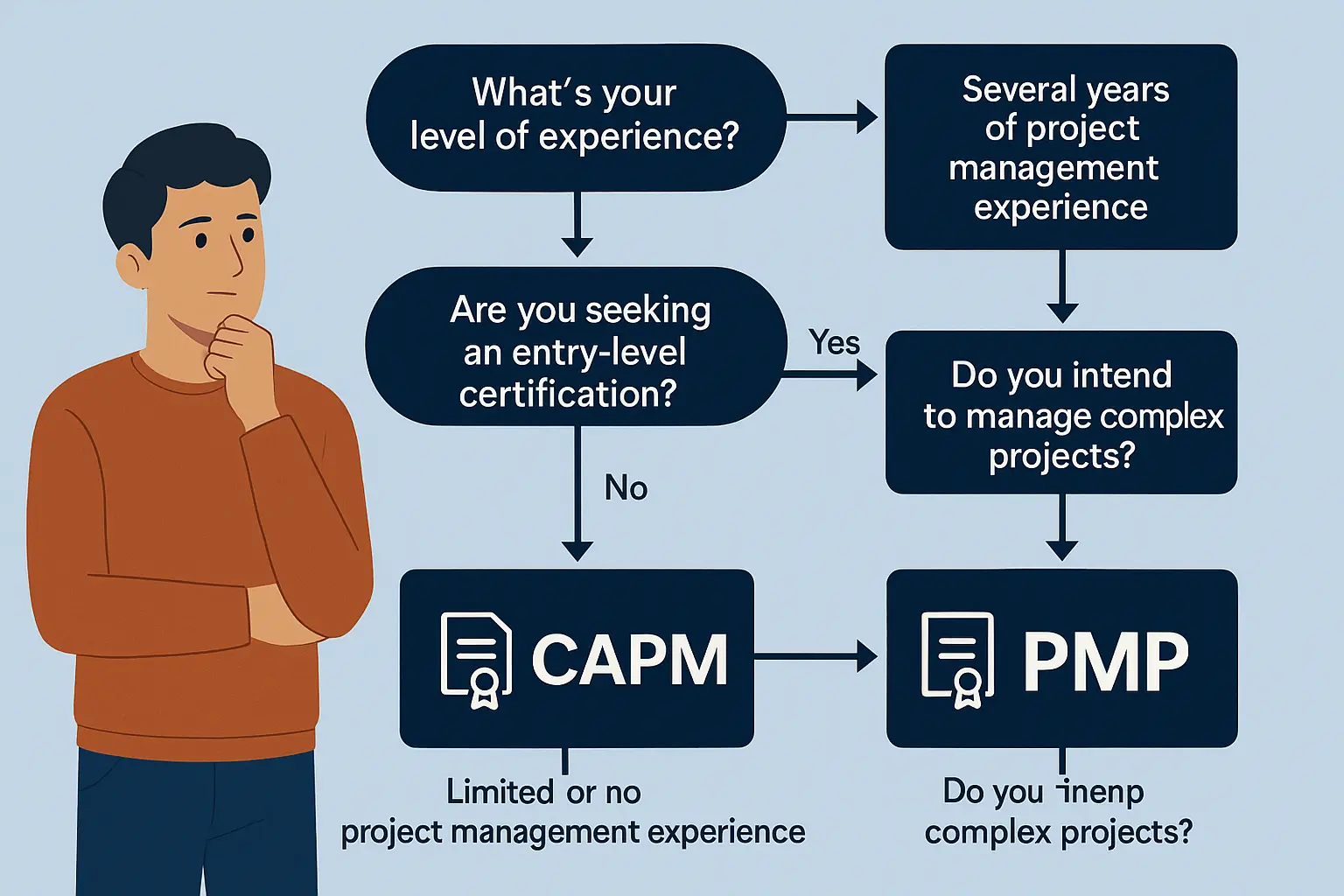CAPM® Certification vs PMP®: Which Exam Is Harder and Why?
By: Ryan Malaluan, CAPM®; Editor: Geram Lompon; Reviewed by: Alvin Villanueva, PMP®, PMI-ACP®
As you explore the field of
Understanding the differences between these project management certifications is crucial for identifying the right path to achieve your career goals. This article compares the CAPM® and PMP® exams, highlighting their challenges, formats, and industry value to help you make the best decision for your career path.
Key Takeaways
- Understand the difference between CAPM and PMP certifications.
- Discover the unique challenges and exam difficulties associated with each credential.
- Discover which certification aligns with your professional goals.
- Review the eligibility, format, and exam costs.
- Gain insights into the industry’s most in-demand professional certifications.
Overview of CAPM and PMP Certifications
When entering the project management career, understanding the credentials offered by the
What is CAPM Certification?
The CAPM certification is intended for aspiring or assistant project managers. It validates your understanding of project management fundamentals and prepares you to apply
What is PMP Certification?
The PMP certification represents the gold standard in
Eligibility Requirements Comparison
When comparing the CAPM certification vs PMP, eligibility is a key factor. Both certifications require a mix of education and experience, but the level of each varies significantly. The CAPM is designed for those starting their
Understanding these prerequisites will help you choose the certification that aligns with your career goals, whether you’re seeking foundational skills or aiming to lead complex projects as a certified project management professional.
CAPM Prerequisites
To qualify for the CAPM exam, you need to meet the following eligibility criteria set by the
- A secondary degree (e.g., high school diploma or associate’s degree)
- 23 contact hours of project management education completed before the exam
These prerequisites make CAPM an excellent entry point for assistant project managers or anyone seeking an entry-level certification. It emphasizes
PMP Prerequisites
Eligibility for the PMP certification exam is more demanding and reflects its focus on experienced professionals. You must meet one of the following combinations:
- A four-year degree, plus 36 months of experience leading projects, and 35 hours of project management training
- A secondary degree with 60 months of
project management experience, and 35 hours of project management training or a course from a PMI authorized training partner
These requirements align with PMP certification requirements and demonstrate readiness to manage complex projects and teams effectively.
CAPM Certification vs PMP: Exam Structure and Format
Understanding the structure and format of each exam is essential for adequate exam preparation. Both the CAPM and PMP certification exams assess your understanding of
While the CAPM exam focuses on theory and foundational knowledge, the PMP exam evaluates your ability to apply skills in real project scenarios. Understanding these differences can help you select the most suitable certification based on your learning style and career goals
CAPM Exam Format
The CAPM exam is designed to test your understanding of
- 150 multiple-choice questions (15 are unscored and for pre-testing)
- 3-hour exam duration
This format focuses on evaluating your grasp of the project management body of knowledge through theoretical concepts and terminology.
Ideal for CAPM certification holders and entry-level project managers, this exam is a great starting point to demonstrate your knowledge of core concepts in
PMP Exam Format
The PMP certification exam is more complex and application-oriented. It consists of:
- 180 questions across three domains (People, Process, Business Environment)
- A mix of multiple-choice, drag-and-drop, and hotspot questions
- 4-hour exam duration
The exam emphasizes situational awareness, practical application, and project compliance. According to the PMP handbook, it reflects real-world expectations for managing complex projects.
Candidates must demonstrate how they apply project management knowledge in challenging environments, aligning with the expectations of PMP professionals and experienced project managers.
Which Exam Is Harder? Direct Comparison
Determining which exam is more challenging depends on your
The CAPM is ideal for those new to the field, while the PMP challenges experienced professionals aiming to lead complex projects. Let’s examine the key differences in conceptual difficulty, pass rates, and the perspectives of industry experts on both exams.
Conceptual Difficulty
The CAPM exam focuses on foundational knowledge, enabling candidates to understand the basic concepts of
- CAPM: Theory-heavy; great for those without experience leading projects
- PMP: Application-based; requires proven ability to direct project teams
The PMP certification exam is more advanced, assessing your ability to handle real-life situations and make informed decisions across project phases.
Pass Rates
The
- CAPM Pass Rate: ~65–75%
- PMP Pass Rate: ~55–65%
The lower pass rate for the PMP exam indicates that it requires a deeper understanding of
Expert Opinions
Most experts agree that the PMP exam is significantly more difficult. It tests your ability to apply knowledge in dynamic, real-world environments, far beyond simple recall.
The PMP requires strong decision-making skills, experience in
Ultimately, exam difficulty is shaped by your experience, exam preparation, and readiness to take on advanced
Key Factors Contributing to Exam Difficulty
- Breadth vs. Depth: The CAPM covers a wide range of topics, while the PMP delves deeply into real-world applications.
- Situational Questions: These dominate the PMP exam, testing how you would respond in live project environments.
- Time Constraints: With over 150–180 questions, both exams test your speed and comprehension under pressure.
- Experience-based Scenarios: Only PMP professionals are expected to manage situational analysis and stakeholder decisions.
Preparation Strategies and Study Resources
Preparing for the CAPM or PMP certification exams requires a focused strategy and the right resources. Your approach should align with your learning style, experience, and available study time. Whether you’re pursuing the entry-level CAPM certification or aiming for the more advanced PMP certification, adequate preparation is key.
Below, you’ll find recommended timelines, study tools, and training options to help you succeed and gain confidence in your
CAPM Study Recommendations
If you’re targeting the CAPM certification, preparation typically involves about 2–3 months of focused study:
- Study timeframe: 2–3 months
- Resources: PMI CAPM Handbook, online prep courses, flashcards, and practice tests
- Target: Active CAPM credential holders, entry-level certification seekers
This path is ideal for those starting a
PMP Study Recommendations
For the PMP exam, a more extended preparation period is often necessary, especially given its complexity and emphasis on real-world application:
- Study timeframe: 3–6 months
- Resources: PMP Exam Content Outline, boot camps, PMI courses
- Ideal for: Professionals with a supplemental certification background or in project management roles
The PMP is best for individuals who have already gained
Training Options
Choosing the proper training method can significantly improve your exam preparation results:
- Formal course: Best for structured learners
- Self-study: Suitable for independent learners with strong discipline
Enrolling in a course from a PMI authorized training partner is highly recommended. These providers offer guided instruction, updated materials, and help you meet eligibility requirements, such as hours of
Career Impact and Return on Investment
Earning either the CAPM or PMP certification can significantly enhance your project management career. These credentials demonstrate your commitment to the field and can improve your career path, salary potential, and job opportunities.
The return on investment depends on your experience level, chosen credential, and long-term professional goals. Whether you’re entering the field or advancing into senior roles, the value of certification in today’s job market continues to grow, especially in organizations seeking in-demand professional certifications.
Salary Comparison: CAPM vs PMP
The benefits of certification are clear in terms of salary. On average:
- PMP holders can expect $100,000–$150,000 annually
- CAPM holders often earn $60,000–$90,000, ideal for early-career growth
This salary gap underscores the career advancement potential associated with the PMP credential, which signifies the ability to lead larger projects and deliver higher-impact project outcomes.
For newcomers, the CAPM certification opens doors and provides a solid foundation for launching a career in
Job Market Value
In today’s project management job market, both certifications are highly valued:
- The market shows a strong demand for both credentials
- PMP credentials remain a global equivalent for senior-level project managers
- CAPM is gaining popularity for its value in entry-level project manager roles
As companies prioritize effective leadership and project compliance, having either certification can distinguish you from other candidates, especially when paired with a strong
Professional Development and Renewal
To maintain your certification, ongoing learning is required:
- PMP: 60 Professional Development Units (PDUs) every 3 years
- CAPM: 15 PDUs every 3 years
Keeping your PMI membership status active can lower your exam fee, offer resources for exam preparation, and connect you to a global network of PMI members and project professionals.
This continuous growth supports long-term success and ensures your project management knowledge stays up to date with evolving standards and processes.

Wrapping Up: Making the Right Choice for Your Project Management Career
Deciding between CAPM and PMP certifications comes down to your experience level, education, and career aspirations. If you’re starting in the
On the other hand, if you’ve already gained significant
Both credentials are globally respected and offer substantial benefits, including higher salaries, increased job opportunities, and a more straightforward career path in industries like IT, healthcare, construction, and human resources.
Before choosing, assess your readiness for the certification exam, your current qualifications, and where you see your
References
APMIC. (2024, December 15). How much does a project management certification cost in 2025 ? Retrieved July 9, 2025, from https://apmic.org/blogs/how-much-does-a-project-management-certification-cost-in-2025
Crush The PMP Exam. (n.d.). CAPM vs PMP: Which certification is right for you? Retrieved July 9, 2025, from https://crushthepmexam.com/capm-vs-pmp/
Indeed Editorial Team. (2023, October 10). CAPM vs PMP: Which certification is right for you? Indeed. Retrieved July 9, 2025, from https://www.indeed.com/career-advice/career-development/capm-vs-pmp
Kelley, R. (2024, March 28). How to get PMP certification: An in-depth guide. Forbes Advisor. Retrieved July 9, 2025, from https://www.forbes.com/advisor/education/certifications/get-pmp-certification/
Project Management Institute. (2023, July 12). PMP vs CAPM: Which
Purdue University. (n.d.). CAPM vs PMP certification: Which is best for your career? Retrieved July 9, 2025, from https://www.purdue.edu/projectmanagementcertification/news/capm-vs-pmp-certification/
Wake Forest University School of Professional Studies. (n.d.). CAPM vs PMP: Which

